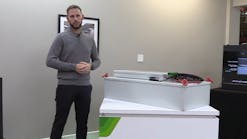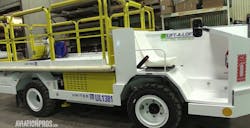SALINA -- Kansas State University at Salina's unmanned aircraft systems program office has landed key authorization from the Federal Aviation Administration that will benefit program offerings and students.
The office recently became one of only a few civil entities granted a certificate of authorization within Class D airspace from the Federal Aviation Administration. The authorization allows the program, based at the Salina Municipal Airport, to operate its unmanned aircraft, an Aerosonde Mk 4.7, in the national airspace system.
"K-State's certificate of authorization allows our students to practice handing control over to the next ground station, practice simulated lost-link procedures, and experience scenario-based mission deployments, all of which will prepare them for possible search-and-rescue mission deployments in the future," said Josh Brungardt, director of the unmanned aircraft systems office. "This certification of authorization enhances the unmanned aircraft training capabilities already available at K-State Salina."
Brungardt estimates a minimum of 10 students will assist with each practice mission.
"Our unmanned aircraft systems classes are filled to capacity this semester," said Kurt Barnhart, aviation department head. "Students recognize that we provide a unique training program and they are excited for the hands-on experience."
Even though unmanned test flights are new for the Salina runway, the airport does not foresee any complications.
"The Salina airport hosts a variety of manned aircraft, and unmanned procedures are no different," said Tim Rogers, an accredited airport executive and executive director of the Salina Airport Authority. "Runway 17-35 is ideally suited for K-State unmanned aircraft systems operations and training missions."
"K-State is advancing the use of unmanned aircraft and sensors for future commercial missions," said Dennis Kuhlman, CEO and dean of K-State Salina. "Students in our unmanned aircraft systems bachelor's degree program play an active role in this research, preparing them for exciting career opportunities after graduation."
K-State's unmanned aircraft systems program office collaborates with military organizations and the private sector to develop unmanned flight in the nation's airspace and training pilots and operators of unmanned aircraft systems.
K-State also establishes criteria for unmanned aircraft system flight operations, including activity at the Smoky Hill Weapons Range and eventually at the Herington unmanned aircraft system flight facility. The university's program office establishes policies and procedures to enable both military and civilian organizations to fly and test at the area facilities.




